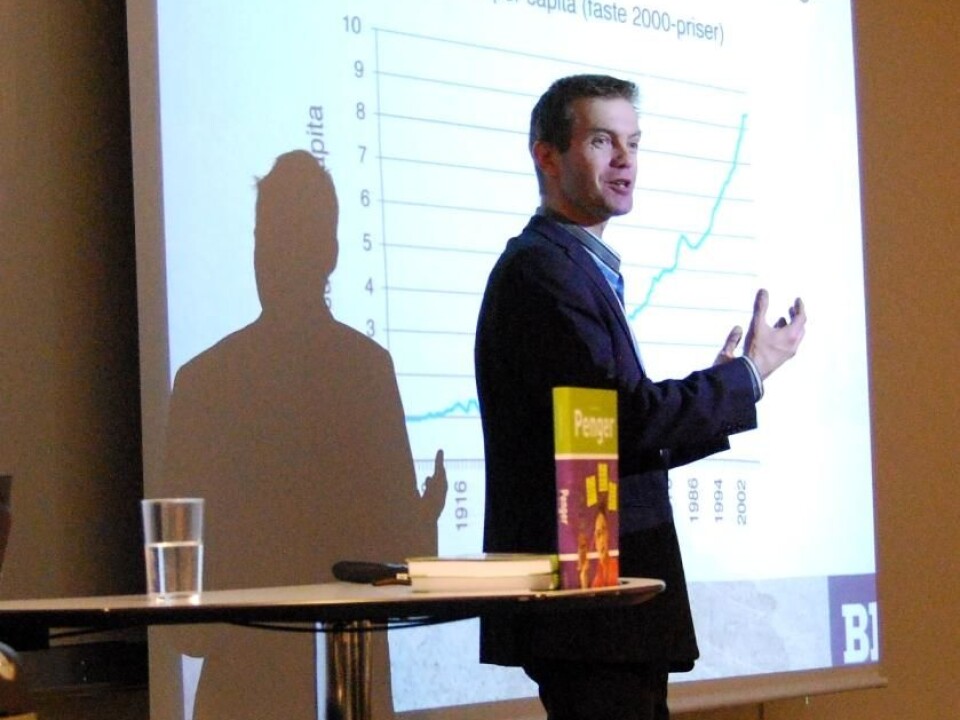
Think in terms of time, not money
If you look at a budget, not as money but as work hours, it becomes obvious that spending lots of money isn’t the solution.
Denne artikkelen er over ti år gammel og kan inneholde utdatert informasjon.
What good would a mound of gold do Robinson Crusoe alone on his island, with no-one to hire?
Professor of economics Erling Røed Larsen made this analogy in a lecture and book launch at BI Norwegian Business School this week.
“Picture Robinson Crusoe finding lots of gold. He’s initially overjoyed: ‘I’m rich! Now I can finally get the hut I’ve wanted and eat the food I crave. Now I can stop working.’ He might think along those lines, at least for a second or two,” says Larsen.
“But who’s going to deliver the accommodation and serve the grilled swordfish? He’s the only supplier of work hours in the area, so the gold is completely useless.”

This is the key to the explanation to why it’s no use throwing money at every problem. What can the money do? What really counts are workers – brains and hands – as Larsen calls them.
“I’ve suggested that as an educational lesson, Norway’s central bank should start printing ‘1 hour of work’ instead of ‘200 Kroner’ on our NOK 200 banknotes. This would help people understand what it’s really all about,” he says.
One hour of work finances 11 hours of leisure
Røed Larsen’s point is that money has no intrinsic value – money is an aid for achieving something important.
All the hours people work in Norway have to cover everyone’s needs.

If, for instance, you need treatment, the physician has to work a certain number of minutes or hours to help you out. This could also require the work of a nurse and a doctor’s secretary − and a share of the work of the bus driver who drove you to the hospital, and so on.
So let’s take a look at the total balance sheet. You don’t need to do the math because Larsen has worked it out:
“According to statistics, we had a total output of 3.8 billion work hours in Norway in 2011. Then if you calculate all the hours these Norwegians lived that year – about 4.5 million Norwegians who lived 24 hours a day for 365 days – you get 44 billion life hours.”
That means one work hour in Norway now has to finance eleven life hours.
“I tried it out once at my cabin. I defined the boring tasks, things like slicing bread and washing the dishes, and relegated them all to a two-hour period. Then the idea was to do nothing but relax the next 22 hours. The experiment collapsed on the first day,” Larsen says in his lecture.
State budget in hours rather than in money
The problem isn’t just poor arithmetic – it gets worse. The number of retired persons and others who don’t work is increasing, but not the number of workers. Perhaps in the near future one work hour will have to finance 13 life hours.
When you look at the balance, not as money but as work hours, it becomes obvious that more oil money isn’t the solution.
“If you drive a lot of oil money into the economy, without doing anything with the work hours, you strengthen the Norwegian krone exchange rate,” he says.
There will be rounds of bids for wages, because there will be more money to divvy out to the same amount of workers, and prices will also rise. But the number of work hours remains the same.
“Then you need move work hours around. If you want to build a new railroad, you’ll have to get the hours from someone who might be working with child care. This is highly sensitive politically – so politicians don’t want to talk about it either.”
He conceives of a central government budget that is in work hours and work minutes rather than in kroner.
“In such a budget if you want to allocate more to a specific task or project, it’s a lot easier to understand that you must take the hours from some other task. But this nobody wants to do.”
A Swede can’t be Norway’s prime minister
One solution to the problem is to become more effective, in other words accomplish more per hour of work. Another is to import more labour power.
Norway is currently in second place in the world with regard to efficient workers, so Larsen doesn’t think increasing productivity is the answer.
The country has imported a lot of labour power. According to the professor, Norway’s combined number of work hours increased by 600 million from 2003 to 2011. Much of the increase has come from Sweden, Denmark, Poland and other countries near and far.
”Worker immigration is a good thing ideologically and economically. It improves the lives of those who are engaged in it and it enables us to offer the services and goods we want. Norway will continue to attract foreign labour power in the years to come,” says Larsen.
But not all jobs are suitable for Americans or Latvians, or even Swedes.
“Some things are easy enough – anybody can mop a floor, for instance. But you can’t outsource the prime minister and it’s obvious that a Norwegian teacher has to speak Norwegian well. So the question is how large a share of the Norwegian demand for labour can be replaced by foreign workers?” he asks.
“Besides, they might leave us. And when we run out of oil and they no longer want to move to Norway – are Norwegians willing to take on the work hours in typical manual or unskilled jobs that Poles or Swedes are now doing for us?”
Today this question remains unanswered, but Erling Røed Larsen thinks it would make an intriguing research project.
Source:
Erling R. Larsen: Penger – hvorfor er det så dyrt i Norge? [Money − Why is it so expensive to live in Norway?] Lecture at the Norwegian Business School BI, 26 April 2012
Translated by: Glenn Ostling
































